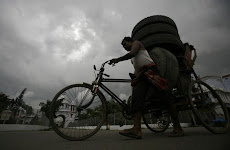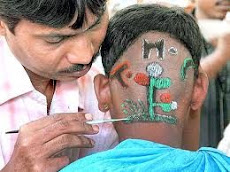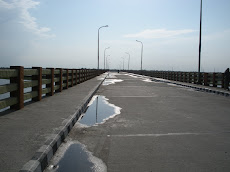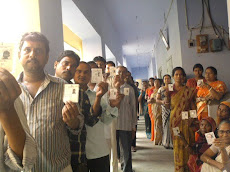 Dhaka, 5 July : Bangladesh plans to have the portrait of its founding father, slain former president Sheikh Mujibur Rahman on all currency notes, its finance minister said Sunday. The minister, A.M.A. Muhith, told parliament that the government has planned to introduce all currencies inscribed with portraits of the man who is revered as Bangabandhu.
Dhaka, 5 July : Bangladesh plans to have the portrait of its founding father, slain former president Sheikh Mujibur Rahman on all currency notes, its finance minister said Sunday. The minister, A.M.A. Muhith, told parliament that the government has planned to introduce all currencies inscribed with portraits of the man who is revered as Bangabandhu.His daughter, Sheikh Hasina, is currently the prime minister. "Currencies of all denominations - from taka five to taka 1,000 and coins from taka one to taka two - will have the images of Bangabandhu," Muhith was quoted by Star Online as saying in parliament. His portraits adorned taka, the currency the country switched to after separating from Pakistan in 1971.
Mujib was slain along with most of his family members in a military putsch on 14 August, 1975.
>
Bangladeshi traders support transit facilities to India
 Agartala, 5 July : Bangladesh's industry bodies want transit facilities for India to help it transport cargo to the northeast region through their country. According to them, transshipment can be done through Chittagong and Mongla international ports and Sherpur and Ashuganj river ports, besides through road and railways.
Agartala, 5 July : Bangladesh's industry bodies want transit facilities for India to help it transport cargo to the northeast region through their country. According to them, transshipment can be done through Chittagong and Mongla international ports and Sherpur and Ashuganj river ports, besides through road and railways.
"If Dhaka provides transshipment and logistical support to India to carry machinery, essentials and other goods to northeast through Bangladesh, it would earn revenues and also help improve business and economic activities between the neighbours," India-Bangladesh Chamber of Commerce and Industry president Abdul Matlub Ahmad told reporters here Sunday.
>
Reduce taxes on Hilsa fish, say Bangla-Indo traders
 Dhaka, 5 July : Bangladesh’s exporters have made common cause with Indian importers to urge Dhaka to reduce taxes on the prized hilsa fish and place it on par with frozen shrimp and other marine products it exports to other countries. Slackening export of Bangladeshi hilsa to India would make way for cheaper hilsa from Myanmar, besides affecting the lives of over 600,000 fisherfolk and traders on both sides, they said at a joint media conference.
Dhaka, 5 July : Bangladesh’s exporters have made common cause with Indian importers to urge Dhaka to reduce taxes on the prized hilsa fish and place it on par with frozen shrimp and other marine products it exports to other countries. Slackening export of Bangladeshi hilsa to India would make way for cheaper hilsa from Myanmar, besides affecting the lives of over 600,000 fisherfolk and traders on both sides, they said at a joint media conference.
Bangladeshi traders support transit facilities to India
 Agartala, 5 July : Bangladesh's industry bodies want transit facilities for India to help it transport cargo to the northeast region through their country. According to them, transshipment can be done through Chittagong and Mongla international ports and Sherpur and Ashuganj river ports, besides through road and railways.
Agartala, 5 July : Bangladesh's industry bodies want transit facilities for India to help it transport cargo to the northeast region through their country. According to them, transshipment can be done through Chittagong and Mongla international ports and Sherpur and Ashuganj river ports, besides through road and railways."If Dhaka provides transshipment and logistical support to India to carry machinery, essentials and other goods to northeast through Bangladesh, it would earn revenues and also help improve business and economic activities between the neighbours," India-Bangladesh Chamber of Commerce and Industry president Abdul Matlub Ahmad told reporters here Sunday.
>
Reduce taxes on Hilsa fish, say Bangla-Indo traders
 Dhaka, 5 July : Bangladesh’s exporters have made common cause with Indian importers to urge Dhaka to reduce taxes on the prized hilsa fish and place it on par with frozen shrimp and other marine products it exports to other countries. Slackening export of Bangladeshi hilsa to India would make way for cheaper hilsa from Myanmar, besides affecting the lives of over 600,000 fisherfolk and traders on both sides, they said at a joint media conference.
Dhaka, 5 July : Bangladesh’s exporters have made common cause with Indian importers to urge Dhaka to reduce taxes on the prized hilsa fish and place it on par with frozen shrimp and other marine products it exports to other countries. Slackening export of Bangladeshi hilsa to India would make way for cheaper hilsa from Myanmar, besides affecting the lives of over 600,000 fisherfolk and traders on both sides, they said at a joint media conference.  Hilsa, considered to be a delicacy, is being exported to India under the South Asia Preferential Trade Agreement (SAPTA), but Indian importers feel discouraged as the price of Bangladeshi hilsa is higher than the Myanmarese hilsa, the Bangladeshi exporters argued.
Hilsa, considered to be a delicacy, is being exported to India under the South Asia Preferential Trade Agreement (SAPTA), but Indian importers feel discouraged as the price of Bangladeshi hilsa is higher than the Myanmarese hilsa, the Bangladeshi exporters argued.Relaxation of laws, improved transport facilities for the highly perishable commodity and overall relaxation of trade laws has helped. Making out a case for better fish trade were Bangladesh Fish Exporters Association (BFEA) president Ajit Kumar Das, India’s Fish Importers Association president Atur Chandra Das and Bangladesh Federation of Chambers of Commerce and Industry director and hilsa fish exporter Ebadul Haq Chan. The BFEA president demanded review of Bangladesh Bank rules on 10 percent cash incentive for the exporters of frozen shrimp and other fish. He wanted that hilsa exporters should also be provided with the same facility, United News of Bangladesh (UNB) news agency reported.
>
'Manu Valley tea estate' in Tripura now exports tea
 Kailasahar, 5 July : The once sick Manu Valley tea estate here has turned the corner, exporting a huge quantity of its produce to England, Iran and Uzbekistan and enjoying the third position in the Kolkata tea auction.
Kailasahar, 5 July : The once sick Manu Valley tea estate here has turned the corner, exporting a huge quantity of its produce to England, Iran and Uzbekistan and enjoying the third position in the Kolkata tea auction.
What has brought about this success? The general manager of the estate, G C Das, thinks it were mosquito nets. He said when they purchased the estate in 1981, it was plagued by large-scale absenteeism as majority of its workers were most of the time down with Malaria which claims hundreds of lives in Tripura every year. “We just distributed mosquito nets to overcome the problem and over time the production capacity rose from just 80,000 kg to present 24.57 lakh kg annually.” The area under cultivation had also increased from 150 hectares to 200 hectares now, Das said.
On the export front, he said last year one lakh kg of tea produced in the estate was exported to the UK while 30,000 kg of tea was exported to Iran. He said the Manu Valley tea fetches the highest price in the state and is presently third in the Kolkata tea auction.
Das said this year the tea market was doing well following crop failure in Kenya and ethnic violence in Sri Lanka.
 Jalpaiguri, 5 July : Forest officials trapped a leopard that strayed into a tea estate in Doars in West Bengal. Forest officials said the animal might have come out in search of food. Leopards stray into tea gardens as there they feel more safe, are not disturbed and get ample water, said Nripen Saha, ranger, Khunia wildlife.
Jalpaiguri, 5 July : Forest officials trapped a leopard that strayed into a tea estate in Doars in West Bengal. Forest officials said the animal might have come out in search of food. Leopards stray into tea gardens as there they feel more safe, are not disturbed and get ample water, said Nripen Saha, ranger, Khunia wildlife.
The villagers said they lived in constant fear of being attacked by leopards. Leopards stray into villages at night, attack goats, kids, pigs and also children sometimes, said Sanita Munda, a villager. The trapped beast has been taken to the Khunia forest under Jalpaiguri Wildlife-2.ncidents of big cats entering human habitats have on the rise in the region.
Last year, at least 140 leopards fell prey to poachers while 150 and 200 leopard skins and bodies are seized every year from across the country.
 Kailasahar, 5 July : The once sick Manu Valley tea estate here has turned the corner, exporting a huge quantity of its produce to England, Iran and Uzbekistan and enjoying the third position in the Kolkata tea auction.
Kailasahar, 5 July : The once sick Manu Valley tea estate here has turned the corner, exporting a huge quantity of its produce to England, Iran and Uzbekistan and enjoying the third position in the Kolkata tea auction.What has brought about this success? The general manager of the estate, G C Das, thinks it were mosquito nets. He said when they purchased the estate in 1981, it was plagued by large-scale absenteeism as majority of its workers were most of the time down with Malaria which claims hundreds of lives in Tripura every year. “We just distributed mosquito nets to overcome the problem and over time the production capacity rose from just 80,000 kg to present 24.57 lakh kg annually.” The area under cultivation had also increased from 150 hectares to 200 hectares now, Das said.
On the export front, he said last year one lakh kg of tea produced in the estate was exported to the UK while 30,000 kg of tea was exported to Iran. He said the Manu Valley tea fetches the highest price in the state and is presently third in the Kolkata tea auction.
Das said this year the tea market was doing well following crop failure in Kenya and ethnic violence in Sri Lanka.
>
Forest officials trap leopard from Doars tea garden
 Jalpaiguri, 5 July : Forest officials trapped a leopard that strayed into a tea estate in Doars in West Bengal. Forest officials said the animal might have come out in search of food. Leopards stray into tea gardens as there they feel more safe, are not disturbed and get ample water, said Nripen Saha, ranger, Khunia wildlife.
Jalpaiguri, 5 July : Forest officials trapped a leopard that strayed into a tea estate in Doars in West Bengal. Forest officials said the animal might have come out in search of food. Leopards stray into tea gardens as there they feel more safe, are not disturbed and get ample water, said Nripen Saha, ranger, Khunia wildlife.The villagers said they lived in constant fear of being attacked by leopards. Leopards stray into villages at night, attack goats, kids, pigs and also children sometimes, said Sanita Munda, a villager. The trapped beast has been taken to the Khunia forest under Jalpaiguri Wildlife-2.ncidents of big cats entering human habitats have on the rise in the region.
Last year, at least 140 leopards fell prey to poachers while 150 and 200 leopard skins and bodies are seized every year from across the country.





















































































































































































No comments:
Post a Comment